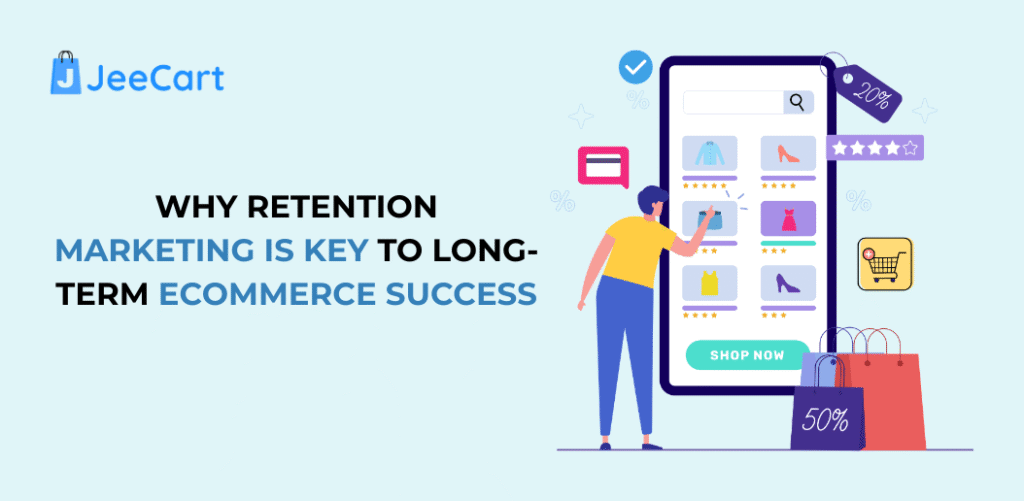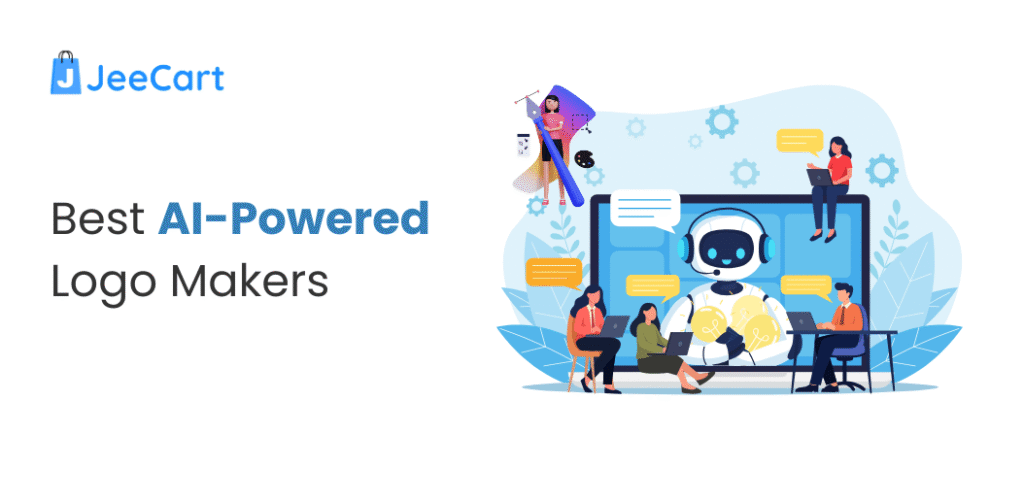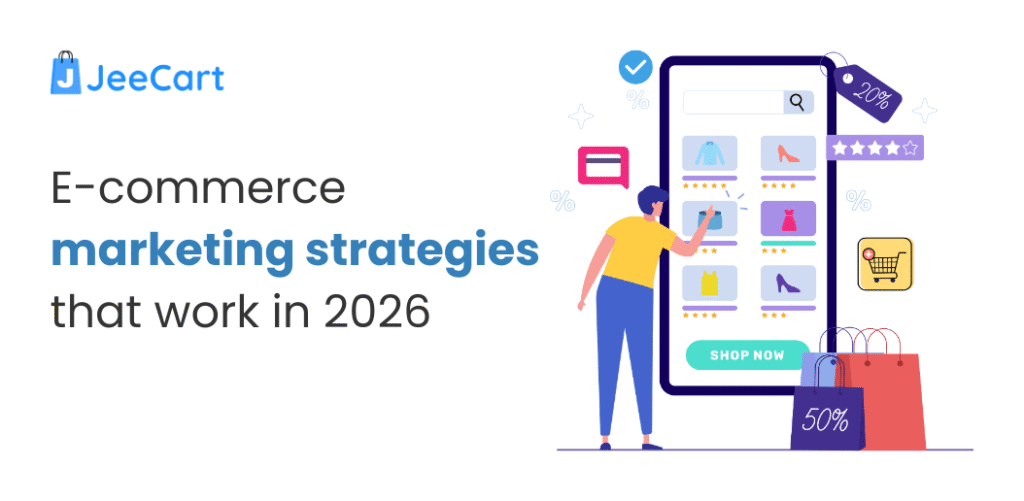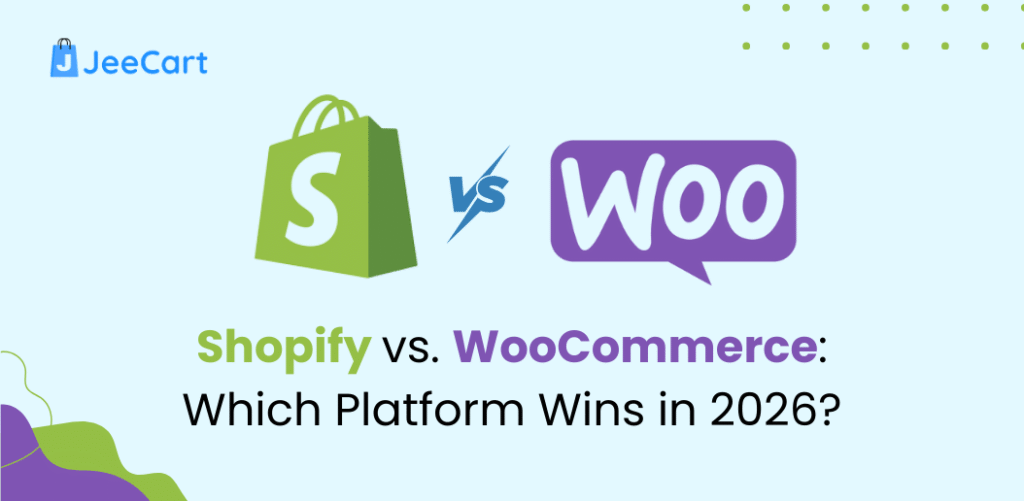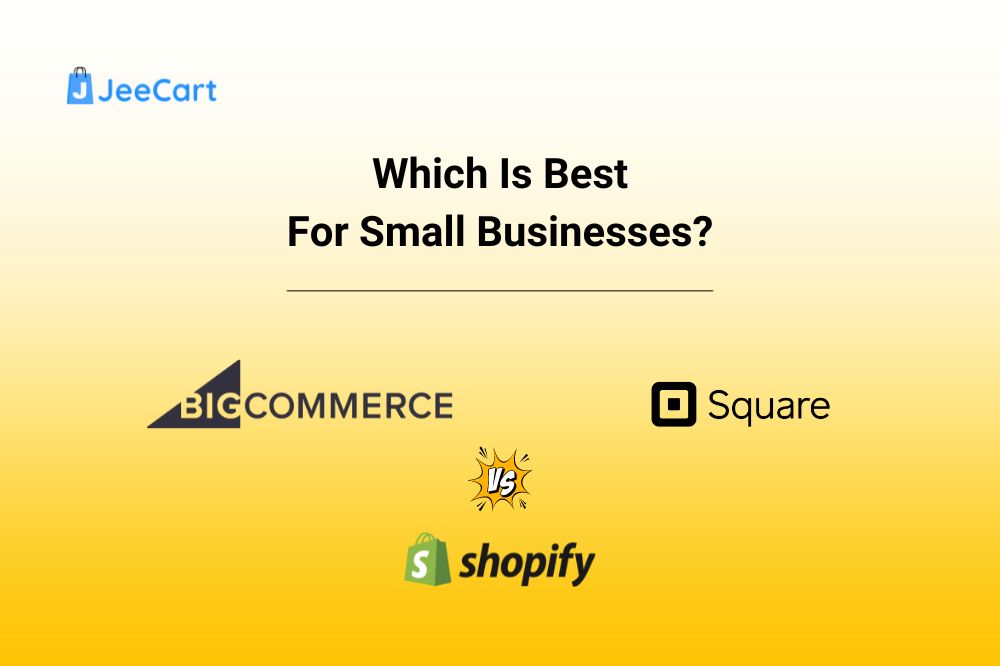
In the ever-evolving digital age, small businesses must choose the right eCommerce platform to thrive. This article will compare BigCommerce, Shopify, and SquareUp, evaluating their strengths and weaknesses to help you determine the best fit for your business. Understanding the nuances of BigCommerce vs. Shopify vs. SquareUp will enable you to make an informed decision that aligns with your business goals.
BigCommerce vs. Shopify vs. SquareUp: An Overview
BigCommerce:

BigCommerce is a powerful eCommerce platform renowned for its scalability and extensive range of features. Founded in 2009, it has become a go-to solution for businesses looking to grow without the limitations of traditional platforms.
Key Features:
- Scalability: BigCommerce is built to handle large product catalogs and significant traffic without compromising performance. This makes it suitable for businesses that anticipate rapid growth.
- Flexible Design Options: It offers numerous responsive themes optimized for mobile devices, allowing businesses to tailor their website’s look to their needs. This ensures your store looks great and functions well on different screen sizes.
- SEO Capabilities: Strong SEO tools, including customizable URLs, meta tags, and sitemaps, help optimize your store for search engines. This is essential for driving organic traffic to your site.
- Security: High security with secure hosting, data encryption, and 99.99% uptime, ensuring your store is always accessible. These features provide peace of mind, knowing your data and transactions are secure.
- Integrations and Apps: A wide range of integrations is available, though not as extensive as Shopify’s app store. This allows you to extend your store’s functionality to meet your business needs.
Pros:
- No transaction fees on any plans, making it cost-effective for high-volume sellers.
- Robust SEO tools to help your site rank higher in search results.
- High scalability for growing businesses, supporting extensive product catalogs.
- Comprehensive security measures to protect your business and customer data.
Cons:
- Higher learning curve for beginners, which can be a barrier for those new to eCommerce.
- Pricing can be higher than other platforms, particularly for advanced plans.
- Customization limitations include the absence of coding knowledge, requiring technical expertise for more complex customizations.
Shopify:

Shopify is one of the most popular eCommerce platforms, known for its user-friendly interface and extensive app store. It’s designed to help businesses of all sizes establish an online presence quickly.
Key Features:
- User-Friendly Interface: Intuitive design allows beginners to quickly set up and manage their online stores. This ease of use is a major selling point for new entrepreneurs.
- Extensive App Store: Thousands of third-party apps enable customization and extend functionality, allowing businesses to add additional features.
- Mobile Responsiveness: Mobile-responsive themes and a dedicated mobile app ensure optimal performance on mobile devices, which is crucial in an increasingly mobile-first world.
- Shopify POS: Integrates online and offline sales, providing a seamless retail experience. This feature is particularly advantageous for online and physical retail businesses.
- Social Media Integration: Directly connects your store to social media platforms like Facebook, facilitating customer engagement and sales. This can help leverage your social media presence to drive traffic to your store.
Pros
- Large community support and resources, offering extensive help and tutorials.
- Robust payment solutions with Shopify Payments, simplifying the checkout process.
- Strong mobile support and features, ensuring your store performs well on all devices.
- Easy to use with minimal technical knowledge, making it accessible for all business owners.
Cons
- Higher costs for advanced features can be a consideration for budget-conscious businesses.
- Dependency on third-party apps can complicate management, as you may need multiple apps to achieve desired functionality.
- Limited SEO customization compared to BigCommerce, which may affect your search rankings.
- Restricted blogging capabilities, making it less ideal for content-heavy marketing strategies.
SquareUp:
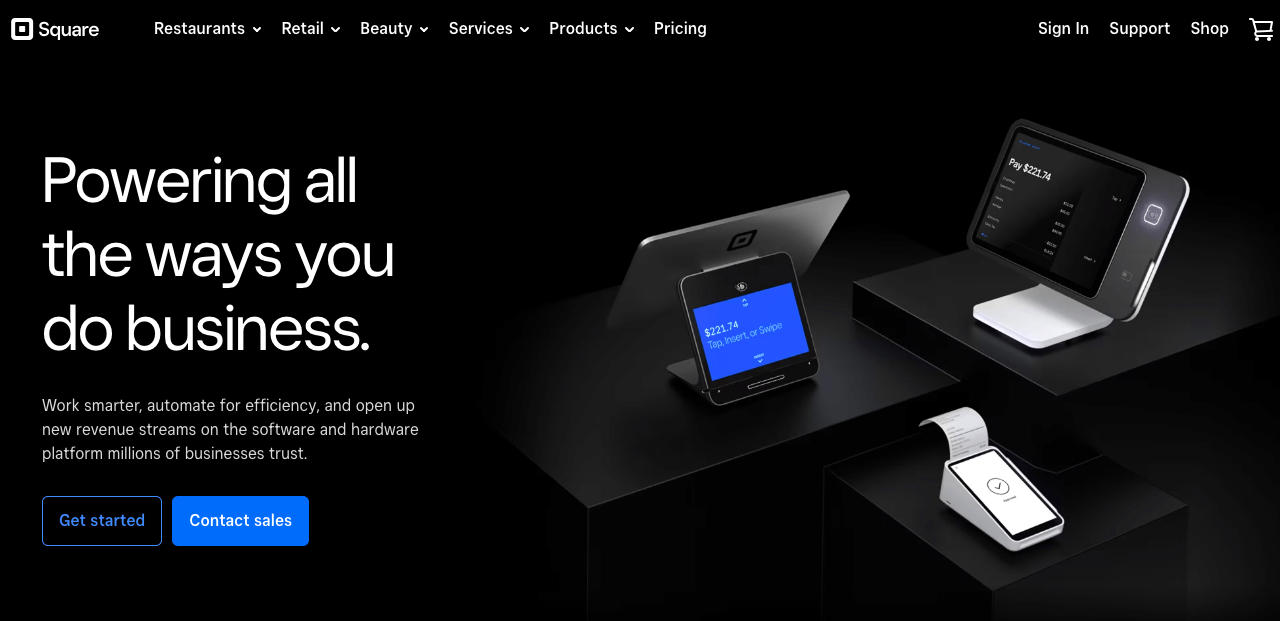
SquareUp, launched in 2009, is a versatile platform designed to empower small businesses with various tools, from payment processing to comprehensive business management solutions.
Key Features:
- Comprehensive Business Tools: Covers sales, payments, payroll, inventory, and more, providing an all-in-one solution for business management.
- Hardware Solutions: Customizable hardware options for in-person sales, such as card readers and POS systems, making it ideal for brick-and-mortar stores.
- Integrations: Seamlessly integrates with website builders and accounting software, ensuring smooth business operations.
- Payment Solutions: Facilitates various payment methods and simplifies checkout processes, enhancing the customer experience.
- Versatile Sales Channels: Enables sales online, in-person, and through social media, providing flexibility in how you sell your products.
Pros
- Free basic plan, making it accessible for startups and small businesses.
- All-in-one solution for business management, reducing the need for multiple software solutions.
- Easy to use and set up, with intuitive tools and interfaces.
- Strong offline sales support with hardware options makes it a good choice for businesses with physical locations.
Cons
- Costs can escalate with add-on services, as additional features often come with extra fees.
- It is less suited for purely online businesses, as it integrates offline sales.
- Fewer eCommerce specific features compared to BigCommerce and Shopify, which may limit its appeal for some online businesses.
Detailed Comparison: BigCommerce vs. Shopify vs. SquareUp
When choosing between BigCommerce, Shopify, and SquareUp, it’s essential to understand how each platform aligns with your business needs. This comparison will delve into key aspects of each platform, highlighting their distinct features, strengths, and potential drawbacks.
Ease of Use
BigCommerce: Known for its robust feature set, BigCommerce offers a powerful platform that can handle large-scale operations. However, this robustness comes with a higher learning curve, making it less intuitive for beginners. The interface is user-friendly but requires some time to master, especially for those new to eCommerce.
Shopify: Shopify is celebrated for its user-friendly interface, making it the go-to choice for beginners. Setting up a store is straightforward, with an intuitive dashboard and easy-to-follow setup guides. The extensive app store simplifies adding functionality without technical knowledge.
SquareUp: SquareUp excels in ease of use, particularly for businesses already using Square for payments. Its seamless integration with Square’s hardware solutions makes it an attractive option for brick-and-mortar businesses looking to expand online. The setup process is straightforward, and the platform is designed for users with minimal technical expertise.
Pricing and Plans
BigCommerce: Offers four pricing plans:
- Standard: $39/month
- Plus: $105/month
- Pro: $399/month
- Enterprise: Custom pricing
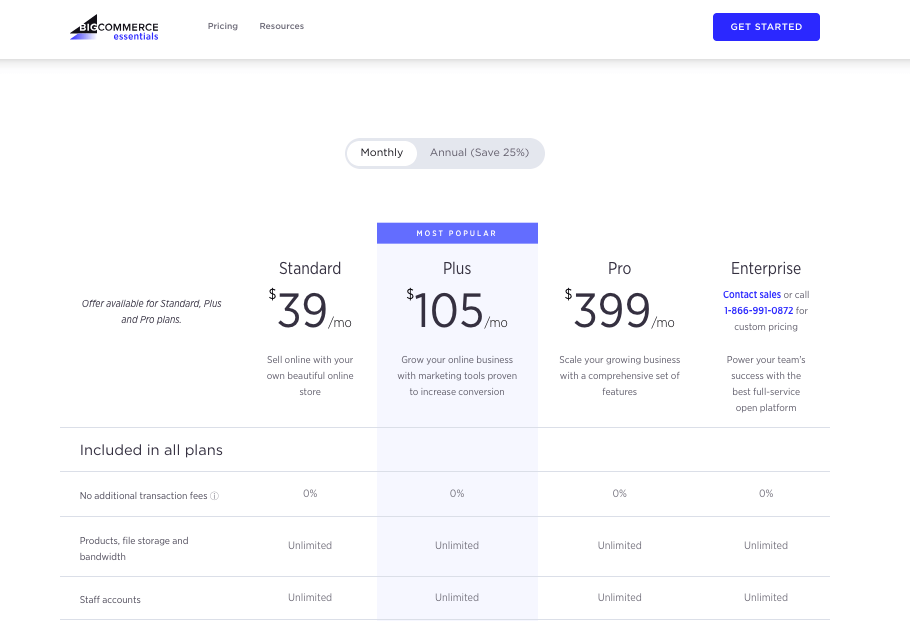
BigCommerce does not charge transaction fees, a significant advantage for high-volume sellers. However, the cost can be high compared to other platforms, particularly for advanced plans.
Shopify: Provides several tiers:
- Basic: $39/month
- Shopify: $105/month
- Advanced: $399/month
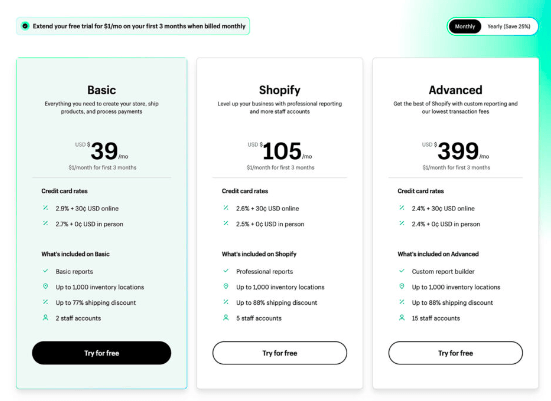
Shopify charges transaction fees unless you use Shopify Payments. While its pricing is competitive, the transaction fees can accumulate, especially if you opt for third-party payment gateways.
SquareUp: Starts with a free basic plan, but costs can escalate with additional services. SquareUp is cost-effective for startups due to its free plan, but businesses should be aware of potential additional fees for extra features.
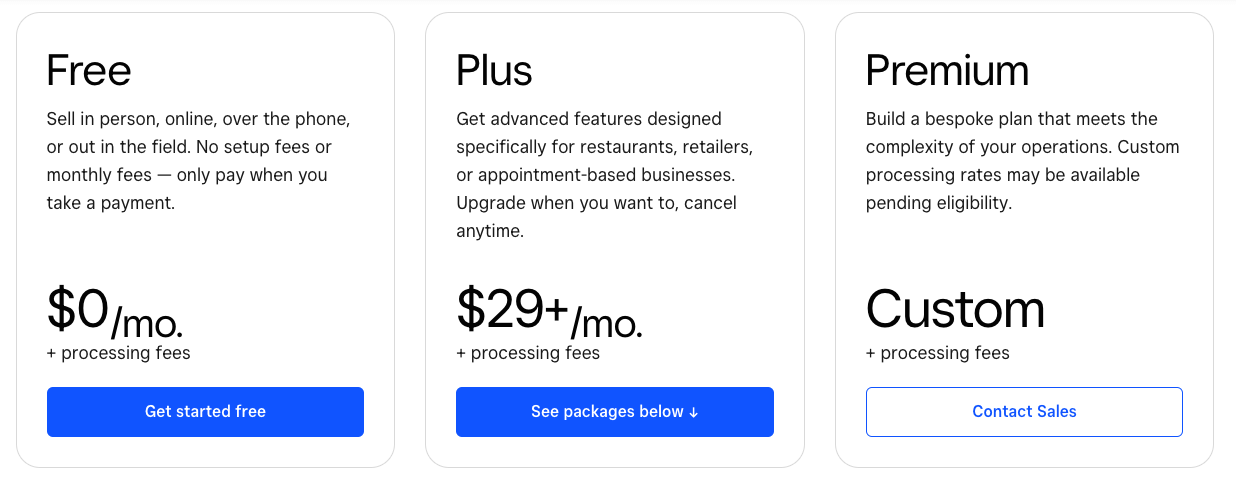
Customization and Design
BigCommerce: Known for its flexibility, BigCommerce offers numerous responsive themes optimized for mobile devices. Its “Open SaaS” solution combines SaaS benefits with API-enabled customization, providing significant flexibility. However, advanced customization may require coding skills.
Shopify: Boasts an extensive theme library and app store, allowing users to easily customize their stores. No prior design experience is needed, making it accessible to all users. The platform’s flexibility in customization without requiring technical knowledge is a major selling point.
SquareUp: Offers basic customization with a focus on functionality. While it provides the essential tools needed to create a functional online store, its design options are more limited compared to BigCommerce and Shopify. The platform is more geared towards integrating online and offline sales seamlessly.
Features and Integrations
BigCommerce: Excels with built-in tools and strong SEO capabilities. Features like customizable URLs and meta tags help optimize stores for search engines. BigCommerce supports many integrations, though its app marketplace is smaller than Shopify’s.
Shopify: Shopify’s vast app store and built-in features like Shopify POS and social media integration make it highly versatile. The platform’s extensive app ecosystem allows businesses to add nearly any functionality they need, from marketing tools to inventory management.
SquareUp: Offers comprehensive business management tools that integrate well with other platforms like website builders and accounting software. It provides a robust set of tools for managing sales, payments, and more, though it may lack some eCommerce specific features compared to BigCommerce and Shopify.
Payment Processing
BigCommerce: Supports multiple payment gateways without charging transaction fees, offering flexibility and cost savings. This is particularly advantageous for high-volume sellers who use various payment methods.
Shopify: Offers Shopify Payments and integrates with other popular gateways. However, it charges transaction fees if you don’t use Shopify Payments, which can increase overall costs. Shopify Payments simplifies the checkout process but may not be the best option for businesses already using other gateways.
SquareUp: Excels in payment integration, offering various methods and a user-friendly checkout process. Its integrated payment solutions work seamlessly with other business tools, simplifying transaction management for businesses.
SEO and Marketing Tools
BigCommerce: Offers strong SEO tools, including customizable URLs and meta tags, helping businesses optimize their stores for search engines. This is crucial for boosting organic traffic and enhancing search engine rankings. Moreover, BigCommerce supports integration with multiple marketing tools, further strengthening its SEO capabilities.
Shopify: Has built-in SEO features and a range of marketing tools, though its SEO customization options are not as extensive as those of BigCommerce. Shopify excels in social media integration, allowing businesses to connect their stores directly to platforms like Facebook and Instagram, facilitating customer engagement and marketing efforts.
SquareUp: Provides basic SEO tools and focuses more on integrated marketing solutions. It enables businesses to manage email campaigns, loyalty programs, and social media marketing from a single platform. While it may not offer the advanced SEO customization of BigCommerce, its marketing tools are comprehensive and user-friendly.
Customer Support
BigCommerce: Offers 24/7 support through live chat, phone, and an extensive knowledge base. While the support is reliable, the platform’s complexity means users may need to invest time in mastering its features.
Shopify: Provides 24/7 customer service, tutorials, and community forums. The extensive support network is invaluable for new users needing assistance or advice.
SquareUp: Offers strong support, particularly for its payment solutions. It provides a comprehensive help center, community forums, and customer service. While its eCommerce support may not be as specialized as Shopify’s or BigCommerce’s, it effectively supports businesses using its payment and business management tools.
Use Cases and Recommendations
Best for Startups
For startups, SquareUp offers a free basic plan and an all-in-one solution, making it the most cost-effective choice. Its comprehensive business tools and user-friendly interface make it easy for new businesses to manage their operations without incurring high costs. Shopify’s user-friendly interface and affordable starter plan also make it a strong contender for new businesses, providing scalability and a wide range of features as the business grows.
Best for Growing Businesses
BigCommerce’s scalability and robust features make it ideal for growing businesses that require extensive product catalogs and high-traffic handling. Its strong SEO capabilities and wide range of integrations support business expansion and online visibility. Shopify’s flexibility and extensive app store also support business growth, though costs can increase with advanced features and app dependencies.
Best for Brick-and-Mortar Businesses
SquareUp shines for brick-and-mortar businesses with its comprehensive hardware solutions and seamless online and offline sales integration. Its POS system and payment processing tools make it easy for businesses to manage physical and online stores. Shopify’s POS system also effectively supports physical stores, providing a unified sales experience and strong mobile support.
Conclusion
In the BigCommerce vs. Shopify vs. SquareUp debate, each platform has unique strengths catering to different business needs. BigCommerce is ideal for scalable and SEO-focused businesses, offering extensive features and robust security measures. Shopify excels with its user-friendly interface, vast app store, and strong community support, making it suitable for businesses of all sizes. SquareUp offers a cost-effective, comprehensive solution for businesses integrating online and offline sales, focusing on user-friendly tools and versatile payment solutions.
Choosing the best platform depends on your specific business needs and objectives. You can make a well-informed choice that enhances your small business’s growth and success by analyzing the key features, advantages, and disadvantages of BigCommerce, Shopify, and SquareUp. Whether you value scalability, user-friendliness, or comprehensive business management tools, each platform offers unique benefits to help your business thrive in the competitive eCommerce landscape.
BigCommerce vs. Shopify vs. SquareUp – FAQs:
Which one is better Shopify or BigCommerce?
The choice between Shopify and BigCommerce depends on your business needs. Shopify is well-regarded for its intuitive interface, vast app marketplace, and robust community support, making it particularly suitable for newcomers and small to mid-sized enterprises.BigCommerce, on the other hand, offers robust SEO tools, scalability, and no transaction fees, which are advantageous for larger businesses with extensive product catalogs and high traffic. Shopify may be the better choice if ease of use and vast customization options are your priority. For scalability and cost-effectiveness in high-volume sales, BigCommerce might be more suitable.
What is the difference between Shopify and SquareUp?
Shopify is a comprehensive eCommerce platform designed to help businesses of all sizes create and manage online stores. It offers an extensive app store, customizable themes, and robust SEO features. SquareUp, however, is a versatile platform that integrates payment processing with business management tools. Its POS system and hardware solutions are powerful in offline sales, making it ideal for brick-and-mortar businesses looking to expand online. Shopify excels in eCommerce specific features, while SquareUp provides an all-in-one solution for businesses needing online and offline sales support.
Is BigCommerce good for small business?
Yes, BigCommerce is a good option for small businesses, especially those looking to scale. It offers strong SEO capabilities, a wide range of integrations, and no transaction fees, which can be cost-effective for growing businesses. While it has a steeper learning curve than Shopify, its extensive features and flexibility make it an excellent choice for small businesses aiming for long-term growth.
Does BigCommerce work with Square?
Yes, BigCommerce can work with Square. BigCommerce supports integration with Square for payment processing and POS solutions, allowing businesses to manage online and offline sales seamlessly. This integration enables businesses to synchronize inventory, sales, and customer data across both platforms, providing a unified management system for all sales channels.

